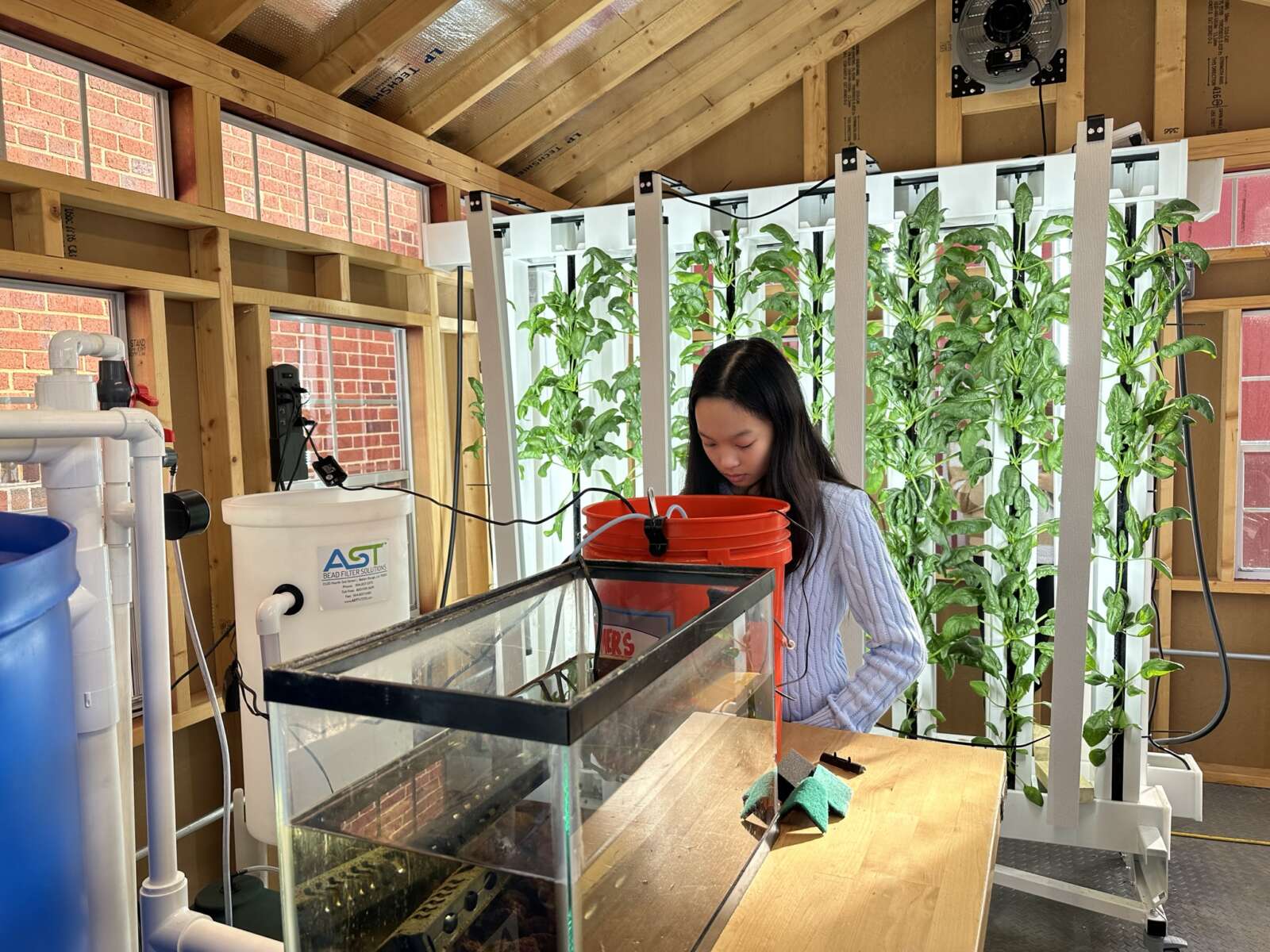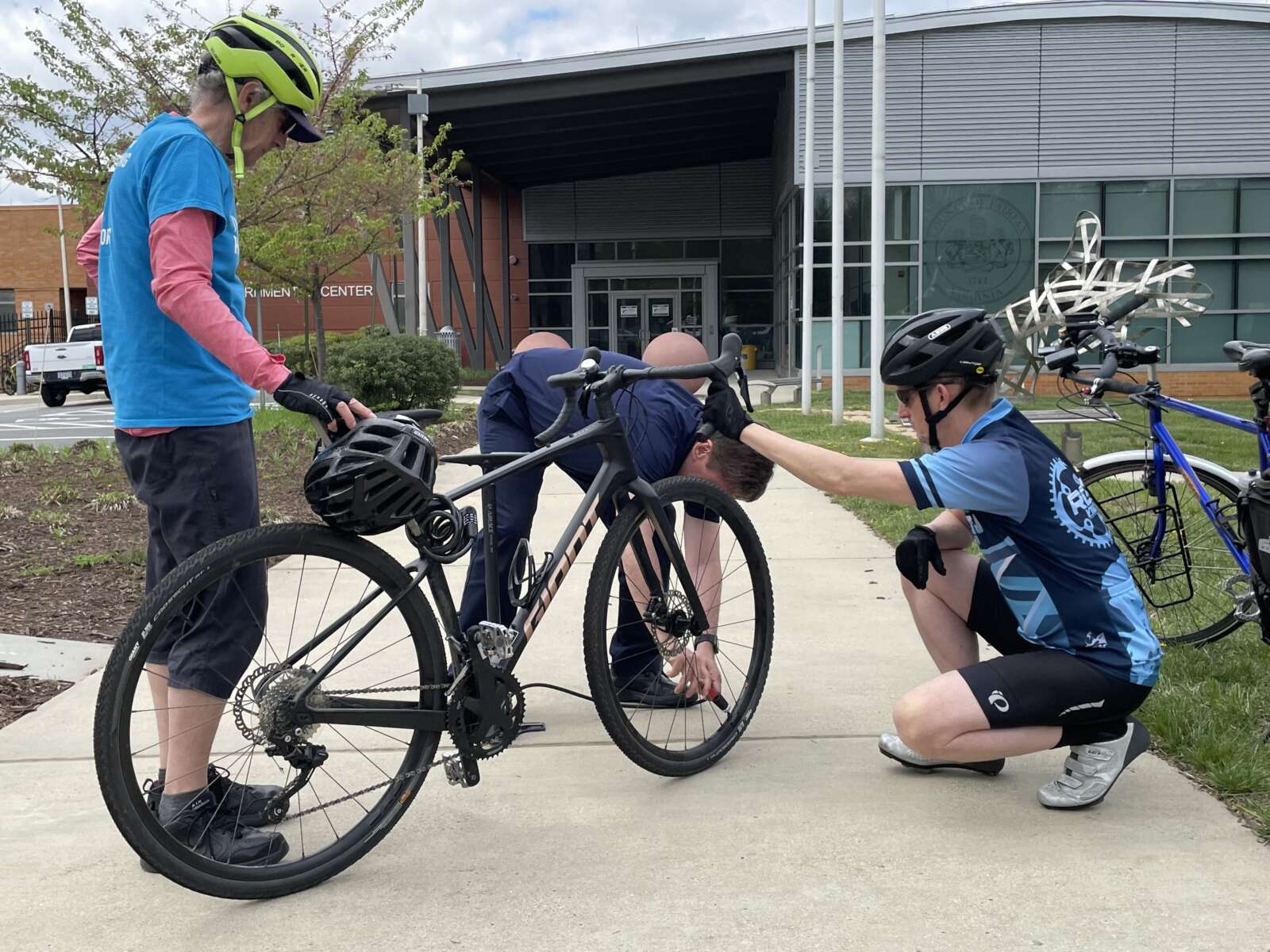In its quest to minimize waste, the vertical farm housed in a shed behind Merrifield’s Luther Jackson Middle School will one day be sustained by fish feces.
Barely the length of a fingernail, the larval tilapia swimming around a small tank in the shed will soon grow large enough to be transferred into a bigger bucket with a filter that separates fish poop and other solids from water.
“The water goes back in the tank, of course, and then, the solids will go down through the filter system, and they will separate from the water and…be turned into sludge we use as fertilizer,” explained Vivian Nguyen, an eighth-grade student at Luther Jackson.
Thanks to Vivian and about 14 other students across four engineering classes, the farm is now operating and producing 50 bags of lettuce or spinach a month, all destined for the school’s food pantry.
It took two years of research, experimentation and waiting for equipment and permit approvals to get the farm to this stage — long enough that the eighth-grader who first conceived of the project has moved on to high school.
Driven by a desire to build a farm on Mars, the student began researching hydroponics — techniques for growing plants without soil — and other means of making food with limited resources for his Center for Equity in Science, Technology, Engineering, English and Math (ESTEEM) project, according to center director and technology education teacher Mark Smith.
The ESTEEM Center raises funds for STEM resources at the six elementary schools that feed into Luther Jackson. With many students in the Falls Church High School pyramid eligible for free or reduced-price lunches, the center is intended to support kids who otherwise might not have access to specialized STEM programs.
Other projects produced by the center include a solar measuring station installed in front of Luther Jackson.
“When you come to middle school and you join drama, you become part of that tribe, or music, that’s a tribe, but we’re trying to create that for STEM, and then we keep them together,” Smith said. “They go on to get advanced degrees and then they help save the world. That’s the whole mission.”
The students who designed, constructed and now maintain the vertical farm, also known as an aquaponics lab, likely aren’t thinking about saving the world just yet.
Vivian, for instance, joined the project at the behest of a friend who shares her interest in fish. She also wanted to get experience working with a team.
Vivienne Bao, a fellow eighth-grader who got involved earlier this semester, says she enjoys the hands-on experience, even if that means taking care of mundane tasks like cleaning up water leaks or picking beads from the filter system out of fish sludge.
“Everything is connected and one misstep can lead to major problems,” she said. “So, everybody needs to work together to solve it, and then we can be successful and grow vegetables.”
A traditional farm plot would require 450 times as much land, along with more time and water, to grow the amount of vegetables generated by the vertical farm, Smith says.
The first delivery to Luther Jackson’s food pantry is expected any day now, according to Jenna von Elling, the school PTA’s food pantry coordinator.
Organized by the PTA, the pantry opens its doors every Wednesday to about 70 families of students who experience food insecurity. It also provides backpacks of food for some students to take home.
Students in need are identified by the school’s social worker and family liaison. Other sources of food for the pantry include local grocery stores and community donors, like the nonprofit Food for Neighbors.
“Our goal is to provide a wide variety of shelf stable food as well as fresh, healthy food like produce, bread and milk,” von Elling said. “Mr. Smith’s Jackson-grown produce will be a welcome addition to our offerings. It’s wonderful that he is helping our students make connections between growing food and caring for their larger community.”
In addition to imparting critical scientific and engineering knowledge, Smith says the ESTEEM Center gives students agency over their own education, teaching them to build “things that don’t come with instructions.”
While all students design, research and write up a project in the school’s engineering newspaper, the biggest impediment to bringing more of their ideas to life is one painfully familiar to adult researchers as well: funding.
Instead of taking money out of the Fairfax County Public Schools budget, the center relies on corporate sponsorships. The vertical farm equipment and shed were purchased with grants from Northrop Grumman, Dominion Energy, and Micron.
Smith says he’s actively looking for more businesses to support his students’ projects.
“We’re always expanding, and we have 16 more ideas on this type of level that we could implement,” Smith said. “We’re just lacking the funds.”






